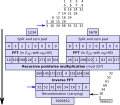algebra, Berlekamp's algorithm is a well-known method for factoring polynomials over finite fields (also known as Galois fields). The algorithm consists...
10 KB (1,759 words) - 20:57, 28 July 2025
The Berlekamp–Massey algorithm is an algorithm that will find the shortest linear-feedback shift register (LFSR) for a given binary output sequence. The...
9 KB (1,222 words) - 06:47, 3 May 2025
Factorization of polynomials over finite fields (category Polynomial factorization algorithms)
the preceding algorithm, this algorithm uses the same subalgebra B of R as the Berlekamp's algorithm, sometimes called the "Berlekamp subagebra" and...
31 KB (4,636 words) - 07:47, 21 July 2025
Berkeley. Berlekamp was widely known for his work in computer science, coding theory and combinatorial game theory. Berlekamp invented an algorithm to factor...
14 KB (1,318 words) - 05:40, 21 July 2025
The Berlekamp–Welch algorithm, also known as the Welch–Berlekamp algorithm, is named for Elwyn R. Berlekamp and Lloyd R. Welch. This is a decoder algorithm...
6 KB (1,600 words) - 18:41, 29 October 2023
In number theory, Berlekamp's root finding algorithm, also called the Berlekamp–Rabin algorithm, is the probabilistic method of finding roots of polynomials...
12 KB (2,006 words) - 20:25, 19 June 2025
time needed to choose the right subsets of mod p factors. Berlekamp's algorithm Berlekamp, E. R. (1967), "Factoring polynomials over finite fields",...
3 KB (308 words) - 02:11, 13 May 2024
The Reeds–Sloane algorithm, named after James Reeds and Neil Sloane, is an extension of the Berlekamp–Massey algorithm, an algorithm for finding the shortest...
934 bytes (88 words) - 20:17, 21 November 2021
modulo a prime number Berlekamp's root finding algorithm Cipolla's algorithm Tonelli–Shanks algorithm Multiplication algorithms: fast multiplication of...
72 KB (7,951 words) - 17:13, 5 June 2025
1981. It is arguably the dominant algorithm for solving the problem, having replaced the earlier Berlekamp's algorithm of 1967. It is currently implemented...
8 KB (1,428 words) - 11:15, 29 March 2025
The Tonelli–Shanks algorithm (referred to by Shanks as the RESSOL algorithm) is used in modular arithmetic to solve for r in a congruence of the form r2...
19 KB (3,751 words) - 01:15, 9 July 2025
A randomized algorithm is an algorithm that employs a degree of randomness as part of its logic or procedure. The algorithm typically uses uniformly random...
33 KB (4,256 words) - 16:11, 5 August 2025
Gosper's algorithm Limit computation via e.g. Gruntz's algorithm Polynomial factorization via e.g., over finite fields, Berlekamp's algorithm or Cantor–Zassenhaus...
18 KB (1,799 words) - 23:49, 11 July 2025
Shor's algorithm is a quantum algorithm for finding the prime factors of an integer. It was developed in 1994 by the American mathematician Peter Shor...
40 KB (5,809 words) - 20:55, 1 August 2025
The Schönhage–Strassen algorithm is an asymptotically fast multiplication algorithm for large integers, published by Arnold Schönhage and Volker Strassen...
26 KB (4,580 words) - 11:43, 4 June 2025
In mathematics, the Euclidean algorithm, or Euclid's algorithm, is an efficient method for computing the greatest common divisor (GCD) of two integers...
126 KB (15,342 words) - 01:03, 25 July 2025
The Karatsuba algorithm is a fast multiplication algorithm for integers. It was discovered by Anatoly Karatsuba in 1960 and published in 1962. It is a...
13 KB (2,046 words) - 20:43, 4 May 2025
co-inventor of the Baum–Welch algorithm and the Berlekamp–Welch algorithm, also known as the Welch–Berlekamp algorithm. Welch received his B.S. in mathematics...
3 KB (199 words) - 18:45, 3 July 2025
The binary GCD algorithm, also known as Stein's algorithm or the binary Euclidean algorithm, is an algorithm that computes the greatest common divisor...
17 KB (1,993 words) - 13:05, 28 January 2025
theory, the Pohlig–Hellman algorithm, sometimes credited as the Silver–Pohlig–Hellman algorithm, is a special-purpose algorithm for computing discrete logarithms...
7 KB (1,035 words) - 18:44, 19 October 2024
and computer programming, the extended Euclidean algorithm is an extension to the Euclidean algorithm, and computes, in addition to the greatest common...
28 KB (4,467 words) - 20:39, 9 June 2025
multiplication algorithm is an algorithm (or method) to multiply two numbers. Depending on the size of the numbers, different algorithms are more efficient...
47 KB (6,886 words) - 11:27, 22 July 2025
Pollard's p − 1 algorithm is a number theoretic integer factorization algorithm, invented by John Pollard in 1974. It is a special-purpose algorithm, meaning...
9 KB (1,251 words) - 18:33, 16 April 2025
In computational number theory, the index calculus algorithm is a probabilistic algorithm for computing discrete logarithms. Dedicated to the discrete...
11 KB (1,763 words) - 17:23, 21 June 2025
theory, Williams's p + 1 algorithm is an integer factorization algorithm, one of the family of algebraic-group factorisation algorithms. It was invented by...
5 KB (831 words) - 21:06, 30 September 2022
Pollard's rho algorithm is an algorithm for integer factorization. It was invented by John Pollard in 1975. It uses only a small amount of space, and...
13 KB (1,755 words) - 06:12, 18 April 2025
Schoof's algorithm is an efficient algorithm to count points on elliptic curves over finite fields. The algorithm has applications in elliptic curve cryptography...
20 KB (4,090 words) - 18:30, 21 June 2025
Integer factorization (redirect from Prime factorization algorithm)
efficient non-quantum integer factorization algorithm is known. However, it has not been proven that such an algorithm does not exist. The presumed difficulty...
25 KB (2,977 words) - 21:02, 19 June 2025
Lenstra–Lenstra–Lovász (LLL) lattice basis reduction algorithm is a polynomial time lattice reduction algorithm invented by Arjen Lenstra, Hendrik Lenstra and...
15 KB (2,154 words) - 23:50, 19 June 2025
Pollard's rho algorithm for logarithms is an algorithm introduced by John Pollard in 1978 to solve the discrete logarithm problem, analogous to Pollard's...
7 KB (1,187 words) - 18:02, 2 August 2024







